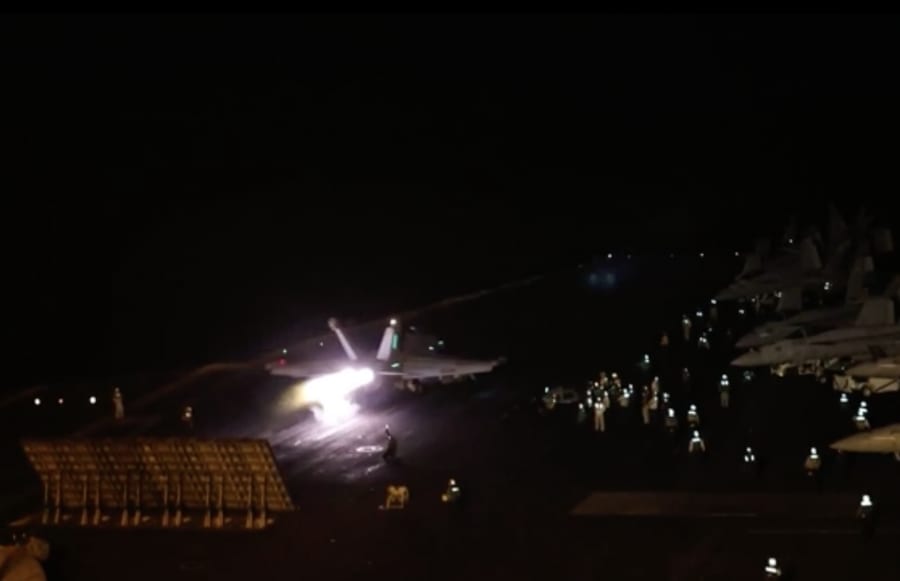US and British forces target various Houthi sites across Yemen in response to attacks on international vessels
Iranian-backed Houthi movement continues launching attacks, disrupting Red Sea shipping and commerce

American and British forces launched fresh strikes on Monday against targets belonging to the Houthi terror group in Yemen, including subterranean arms storage facilities.
The United States formed an international alliance in December – Operation Prosperity Guardian – to address the growing threat from the Iranian-supported terror proxy against international shipping vessels in the Red Sea region.
The latest military operation against the Houthis involved American and British submarines, warships, and fighter jets. While mainly an American-British operation, the mission was reportedly also supported by Canada, Australia, the Netherlands, and Bahrain.
Following the strikes, the six allied nations released a joint statement.
“Our aim remains to de-escalate tensions and restore stability in the Red Sea, but let us reiterate our warning to Houthi leadership: we will not hesitate to defend lives and the free flow of commerce in one of the world’s most critical waterways in the face of continued threats,” the statement read.
The British Defense Ministry stressed the need to confront the Houthi threat by targeting its ability to attack international vessels.
“Our aircraft used Paveway IV precision-guided bombs to strike multiple targets at two military sites in the vicinity of Sanaa airfield. These locations were being used to enable the continued intolerable attacks against international shipping in the Red Sea. This follows our initial operation on 11 January, and subsequent US action, to degrade the Houthis’ capability to conduct such attacks,” the British Defense Ministry said in a public statement.
An American military official confirmed that U.S. and British forces had struck several enemy targets and that the Pentagon “observed good impacts and effects.”
The latest strikes on Monday were the second time in January that the U.S.-led international alliance hit Houthi targets in Yemen. After the first set of strikes, in which approximately 60 Houthi targets in 28 locations were hit, U.S. President Joe Biden stated: “These targeted strikes are a clear message that the United States and our partners will not tolerate attacks on our personnel or allow hostile actors to imperil freedom of navigation in one of the world’s most critical commercial routes.”
“I will not hesitate to direct further measures to protect our people and the free flow of international commerce as necessary,” Biden vowed.
The Houthi terror militia claims that its attacks on international shipping in the Red Sea is being done in solidarity with the Hamas terror organization based in Gaza, which is also an Iranian terror proxy in the Middle East.
The Houthis have attempted to target the Jewish state with attacks throughout the ongoing war in Gaza.
In December, the Israeli Air Force (IAF) neutralized a Houthi drone that had been dispatched toward a school in the southern Israeli city of Eilat, located on the Red Sea.
IDF Spokesman Brig.-Gen. Daniel Hagari condemned the Houthi terror attack and emphasized that the Iranian regime was behind the attack.
“This is an act that is carried out under Iranian directives,” Hagari stated.
CEO of the Foundation for Defense of Democracies (FDD) Mark Dubowitz believes Iran will continue using its terror proxies, such as Hamas and Palestinian Islamic Jihad (PIJ) in Gaza, Hezbollah in Lebanon, and the Houthis in Yemen, for as long as it is able to.
“The regime in Iran will escalate its violence through its Houthi, Hamas, Hezbollah, Palestinian Islamic Jihad, and Kataib Hezbollah proxies until it pays a direct price. It is happy to fight to the last dead Yemenite, Palestinian, Lebanese, Syrian, and Iraqi. But it will back down if the United States uses direct force against the regime and its assets,” Dubowitz said in December.

The All Israel News Staff is a team of journalists in Israel.













